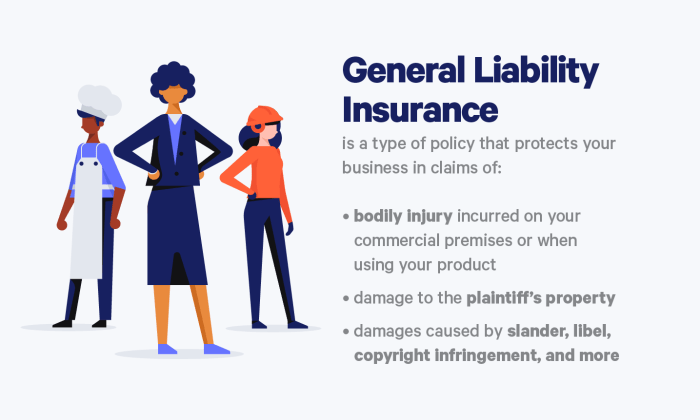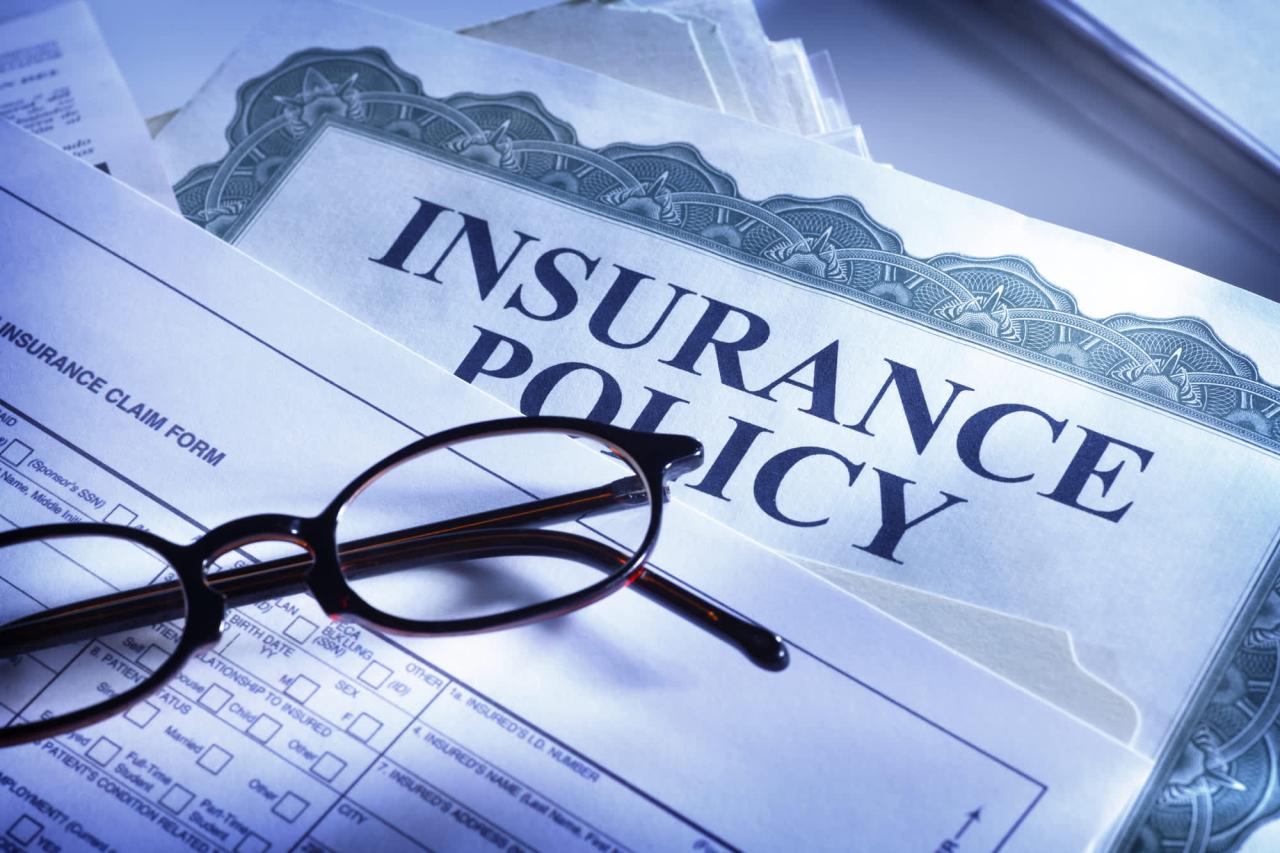Business liability insurance is a crucial aspect of risk management for any enterprise, regardless of size or industry. It acts as a financial safety net, protecting businesses from the potentially devastating costs associated with lawsuits stemming from accidents, injuries, or property damage caused by their operations. This comprehensive guide delves into the intricacies of various liability insurance types, helping you understand your coverage needs and navigate the often complex world of business insurance.
From defining the core concepts of business liability insurance to exploring the claims process and cost factors, we aim to equip you with the knowledge necessary to make informed decisions about protecting your business. We’ll examine different types of coverage, including general liability, professional liability, and product liability, clarifying their distinctions and highlighting situations where each is most beneficial. Ultimately, understanding business liability insurance is key to ensuring the long-term viability and success of your venture.
Key Considerations When Choosing a Policy

Selecting the right business liability insurance policy is crucial for protecting your business from financial ruin in the event of accidents, injuries, or property damage caused by your operations. A well-chosen policy provides peace of mind, allowing you to focus on growing your business rather than worrying about unforeseen liabilities. Careful consideration of several key factors will ensure you secure adequate coverage.
Policy Limits and Exclusions
Understanding the limits and exclusions within your policy is paramount. Policy limits define the maximum amount the insurer will pay for covered claims. For example, a policy with a $1 million general liability limit will only cover claims up to that amount. Exclusions specify situations or types of claims not covered by the policy. Common exclusions might include intentional acts, employee injuries covered by workers’ compensation, or damage caused by pollution. Carefully reviewing the policy document to understand these limitations is essential to avoid unpleasant surprises during a claim. A mismatch between your business’s risk profile and the policy’s coverage can leave you significantly underinsured.
Comparison of Insurance Providers and Offerings
Different insurance providers offer varying levels of coverage, policy options, and pricing. Some insurers specialize in specific industries, offering tailored policies to address unique risks. For instance, a construction company would need a different policy than a software development firm. Comparing quotes from multiple providers allows you to assess the value and comprehensiveness of each policy. Factors such as the insurer’s financial stability, claims handling process, and customer service reputation should also be considered. A reputable provider with a strong financial rating will be better equipped to handle significant claims.
Questions to Ask Insurance Providers
Before committing to a policy, it is vital to ask pertinent questions to ensure the policy meets your specific needs. Clarifying the definition of “occurrence” within the policy is crucial, as it determines what events are covered. Inquiring about the claims process, including the steps involved and the timeframe for resolution, is also important. Understanding the insurer’s approach to risk assessment and its experience in handling claims similar to those your business might face provides valuable insight. Additionally, asking about policy renewal terms and potential premium increases provides transparency and avoids future surprises. Finally, seeking clarification on any ambiguous terms or clauses ensures complete understanding of the policy’s coverage.
Illustrative Examples of Liability Claims

Understanding the potential for liability claims is crucial for any business. This section provides detailed scenarios illustrating how business liability insurance can protect your company from significant financial losses. The examples highlight the diverse range of situations that could trigger a claim and emphasize the importance of having appropriate coverage.
Slip and Fall on Business Premises
A customer slips on a wet floor in your retail store, resulting in a broken leg. Medical bills, lost wages, and pain and suffering could lead to a substantial lawsuit. With business liability insurance, the insurer would cover the legal fees, settlement costs, and potentially the medical expenses. Without insurance, your business would bear the full financial burden, potentially leading to bankruptcy or closure. The financial impact could easily reach tens or even hundreds of thousands of dollars, depending on the severity of the injury and the length of the legal proceedings. This is a common type of claim, and businesses can mitigate this risk by ensuring floors are regularly cleaned and dried, implementing clear signage warning of potential hazards, and maintaining adequate lighting.
Product Liability Claim
Your company manufactures a faulty product that causes harm to a consumer. For example, a malfunctioning appliance causes a fire, resulting in property damage and injury. The injured party could sue your business for damages, including medical expenses, property repair costs, and compensation for pain and suffering. Business liability insurance would cover the legal costs and any settlements or judgments awarded to the plaintiff. Without insurance, the financial consequences could be devastating, potentially exceeding the value of the business itself. To mitigate this risk, thorough product testing, rigorous quality control measures, and clear warnings on product packaging are crucial. Implementing a robust recall procedure is also essential in the event of a product defect.
Professional Negligence Claim
A client sues your consulting firm for professional negligence, alleging that your advice led to significant financial losses. This could involve a mistake in financial planning, a flawed legal strategy, or an error in a medical diagnosis (if applicable). The client’s claim could encompass the financial losses incurred due to your negligence, as well as legal fees and compensation for emotional distress. Business liability insurance would cover the legal costs associated with defending the claim and any damages awarded to the client. Without insurance, the financial consequences could severely impact the business’s reputation and financial stability, potentially leading to its closure. Risk mitigation strategies in this case involve meticulous record-keeping, thorough due diligence, and maintaining professional standards. Regular professional development and adherence to best practices are also essential.
End of Discussion

Securing appropriate business liability insurance is not merely a financial precaution; it’s a strategic investment in the future of your business. By understanding the different types of coverage, the claims process, and the factors influencing premium costs, you can proactively mitigate risks and protect your enterprise from unforeseen liabilities. Remember to carefully review policy details, ask clarifying questions of your provider, and regularly assess your coverage needs to ensure you maintain adequate protection as your business evolves.
FAQ Compilation
What is the difference between general and professional liability insurance?
General liability covers bodily injury or property damage caused by your business operations, while professional liability (errors and omissions insurance) protects against claims of negligence or mistakes in professional services.
How long does it take to get a claim approved?
The time it takes to process a claim varies depending on the complexity of the case and the insurance company. It can range from a few weeks to several months.
Can I increase my coverage limits after purchasing a policy?
Yes, in most cases, you can request to increase your coverage limits. However, this will likely result in a higher premium.
What happens if I file a fraudulent claim?
Filing a fraudulent claim is illegal and can result in the denial of your claim, cancellation of your policy, and potential legal repercussions.
Does my business need liability insurance if I work from home?
Even home-based businesses can benefit from liability insurance. It protects you from claims arising from client visits, product liability, or other incidents related to your business operations.